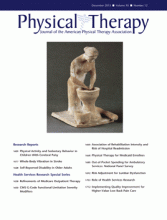Abstract
Background Out-of-pocket (OOP) expenditures are incurred as insurers and employers shift some of the burden of health care costs onto consumers. As cost-sharing increases, OOP expenditures could be a barrier to physical therapy care.
Objective The purposes of this study were: (1) to identify factors associated with any OOP physical therapy spending and (2) to identify factors associated with higher spending among individuals incurring OOP costs.
Design The study was a retrospective analysis using the 4 most recently available panels of data from the Medical Expenditure Panel Survey (MEPS) encompassing 2008–2012.
Methods A data file containing episodes of physical therapy care for 2,189 people was created. Logistic regression was used to identify factors related to having an OOP expenditure. A multivariable generalized linear model was used to identify factors related to mean OOP expenditures.
Results On average, an episode of care encompassed 9.9 visits, with mean total expenditures of $1,708 (median: $792). Fifty-four percent of episodes of care had an OOP expenditure. For individuals with OOP expenditures, the mean OOP expenditure for an episode of care was $351 (median: $144). Being female or non-Hispanic and having a higher income were associated with higher odds of incurring an OOP expenditure, whereas being in worse general health, >65 years of age, or nonwhite and having public funding were associated with lower odds of incurring an OOP expenditure. Amounts of OOP spending were higher in urban areas and in all census geographic regions relative to the Northeast region.
Limitations Estimates are based on household-reported survey data, limited to ambulatory care, and do not include institutionalized individuals.
Conclusions At 54%, the proportion of individuals with OOP expenditures for physical therapy is lower than for general medical care. Several predictors were found of having OOP expenditures and of the magnitude of those expenditures.
Footnotes
Dr Chevan and Dr Riddle provided concept/idea/research design and writing. Dr Chevan provided data analysis and project management. Dr Riddle and Dr Reed provided consultation (including review of manuscript before submission).
- Received January 16, 2015.
- Accepted June 11, 2015.












